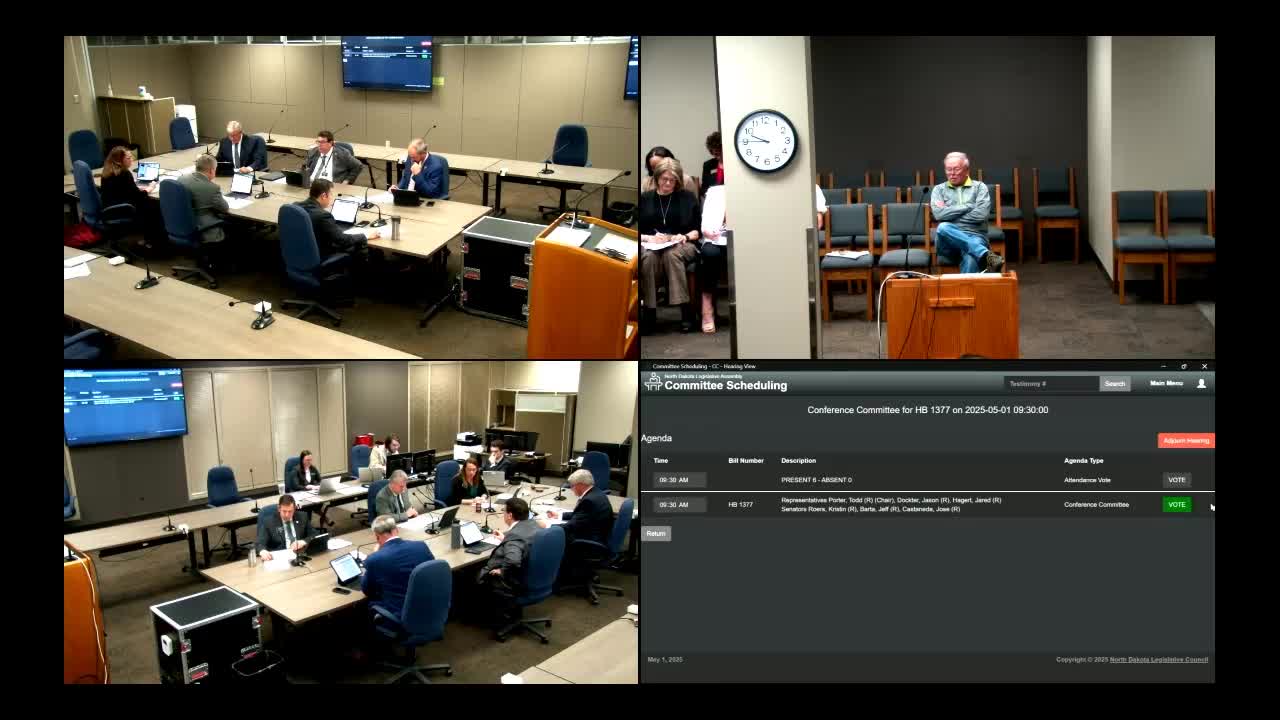Conference committee votes for itemized campaign reporting, agrees on $250 disclosure threshold and public late-filing notices
Get AI-powered insights, summaries, and transcripts
Subscribe
Summary
A House conference committee voted unanimously to require itemized reporting of campaign contributions and expenditures and signaled agreement on a $250 disclosure threshold; North Dakota Secretary of State Michael Howe said late-filing notices will be posted on the public transparency site and can be programmed to show at specified intervals.
A conference committee for the House of Representatives voted to require itemized reporting of campaign contributions and expenditures under proposed changes to section 1377 and indicated agreement on a $250 disclosure threshold while debating how fines and late-filing notices should appear to the public.
The committee's decision to require itemization was adopted by roll call after a motion and second. Chairman Porter asked the clerk to call the roll on the motion "to use itemization instead of aggregation inside of 1377," and the motion carried on a unanimous vote.
The itemization decision narrows how filers will report individual contributions and expenditures instead of grouping them into aggregated categories. Senator Roars moved the motion to adopt itemization, and Senator Barta seconded it. Chairman Porter called the roll and recorded "Yes" votes from Porter, Representative Doctor, Representative Haggart, Senator Roars, Senator Barta and Senator Castaneda; the clerk announced, "Motion carries."
Why it matters: committee members said itemization improves transparency and then shifted to practical questions about how categories should be managed in the reporting system. Committee members debated whether to codify a fixed list of categories or allow the secretary of state's office to provide prefilled options plus a free-text field for filers. Representative Doctor compared the approach to accounting software and said a baseline plus free-text flexibility would cover most cases.
On the disclosure threshold and fines, committee members said both the House and Senate sides had agreed to a $250 reportability threshold for contributions and expenditures, with an inflation adjustment in the bill. Senator Roars described the inflationary language as an automatic inflator every decade, and committee members discussed whether the threshold should escalate by a fixed amount each decade.
Committee members also debated fines and whether unresolved fines should be visible to the public. Michael Howe, North Dakota secretary of state, told the committee that the office plans to program the state's filing system so that "as soon as that filer is not in compliant compliance and there's a missed filing date, that would be a notice on our system." Howe said the office would also maintain its practice of contacting filers directly to encourage compliance.
Senator Castaneda asked whether those notices would be limited to the filer and the secretary of state's office or would be publicly visible. Howe said, "Our intent would be that would be, on the transparency site. Anyone would be able to see that as you're accessing filing records." Committee members discussed whether the first-week late notice could be hidden and then made public after subsequent weeks; Howe said that could be done technically but cautioned it would reduce transparency.
On other items the committee addressed briefly: members agreed to a single, uniform definition of "candidate" for both legislative and statewide offices, and the committee recorded that beginning- and ending-fund-balance reporting was already resolved. The committee also discussed, and then set aside as difficult to implement, a proposal that unpaid fines could affect ballot eligibility.
The committee did not adopt additional formal votes during the session on fines or the disclosure visibility schedule; members left some details for further drafting and for the secretary of state's office to implement in the reporting system. Chairman Porter closed the session and said the group was scheduled to reconvene later the same day.
